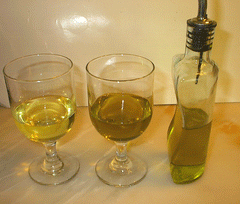Sun protection in a natural plant oil? Probably not after all...
Red raspberry seed (Rubus idaeus) oil was thoroughly analyzed in one 2000 study and among other impressive benefits was its SPF. But it is the ONLY study I can find.
But this particular carrier oil has an additional array of very beneficial properties which are the reasons that we include it in our Skin Renewal Intensive Facial Complex.
Benefits of Red Raspberry Seed Oil:
I love this oil and here are the reasons why. This oil will be available for sale on our website soon. Our virgin Raspberry Seed Oil is cold-pressed, unrefined and extracted from the seeds of raspberry fruit without solvents or chemical processing.
1. Contains 83% and greater (depending on source of information) of essential fatty acids, which is quite high by the way, and the ratio of linoleic, alpha linolenic and oleic, has been shown to significantly reduce the effects of oxidative stress - free radical damage - which equals aging and wrinkles.
2. Contains high levels of carotenoids, which is vitamin A, and well-known for its skin healthy and anti-aging benefits. Scientists say that mixtures of carotenoids when used with other antioxidants, such as vitamin E, can increase the overall activity against free radicals."
3. Contains "exceptionally high levels of alpha & gamma tocopherols (Vitamin E) and when combined with its Vitamin A content, provides excellent antioxidant activity." The gamma tocopherol (137-272 mg/100 grams) is "much higher than those reported for other vegetable oils and foods."
4. Due to its high levels of phytonutrients and antioxidants, it is believed to contain clinically significant anti-inflammatory properties. Which is why it is good for rosacea.
5. High SPF broad spectrum, UVA and UVB, protection? The one and only study that is often quoted is from 2000 by Oomah, et all, and goes into quite some detail about the properties and benefits of this oil. They say that one of the really unique and beneficial properties about raspberry oil is its very high levels of natural SPF ranging between 28 and 50. In fact, it was noted that this oil when tested at full strength was equal to titanium dioxide in sun protection capabilities. You will find titanium dioxide used in many sunscreens. SPF values are never exact and how one person responds compared to another depends on many factors including skin health in general. However, adding this oil to any formula could possibly increase its natural sun protection properties. So - that being said, I would not depend on the proported SPF in this oil to provide the skin with significant broad-spectrum protection from both UV-A or UV-B rays.
Physical Properties:
I read several different and conflicting opinions as to color, texture and smell of this oil. One source said it had a "fishy" odor and another that it had a "mild, pleasant, berry-like" odor. I have purchased from 2 different reputable sources over the past 6 to 7 years and I find it to have a pleasant, almost berry-like odor as well. It's a light golden color. The viscosity is medium, it absorbs quickly and is non-greasy. Due to its stability and significant antioxidant properties, it could be used in a formulation to help extend the life of other oils more prone to early oxidation. I still keep it refrigerated though, in dark glass bottles.
Finally, not only does the oil have important benefits for the overall health of your skin, it also has specific benefits that significantly improve the texture and dryness of your skin. It is emollient, very moisturizing, and as mentioned earlier anti-inflammatory - which is why it is particularly good for those of us with rosacea. Use is as a stand-alone anti-aging wrinkle reducer or add it to other oils for an easy answer for moisturizing AND sun protection. We like to add it to jojoba oil which has a low SPF value of around 4 - but there are only a few oils that have sun protection properties.
We include this oil in our Organic Skin Renewal Intensive Facial Complex you can find here.
Have you used raspberry seed oil? Have you used it as a sunscreen and how well did it work for you?
Thanks for listening!

Ann's mission statement is to provide health and wellness information to you and your family that you may not find in your every-day newspapers or Prevention magazines. Her college studies, certifications and passionate self-study have provided her with a huge spectrum of understanding of the intricate issues and debates concerning health and nutrition. Ann is a Critical Care Registered Nurse, a Certified Clinical Aromatherapy Professional, and has been studying nutrition, aromatherapy, skin care health and medicinal herbalism for at least 13 years. Not so surprisingly, all of these interact for health and wellness at a level we all want to achieve. She is an ardent pursuer of verified research and information and spends huge amounts of time searching for information that is relevant and evidence based. We sincerely hope you benefit from her efforts.




















